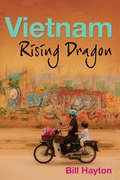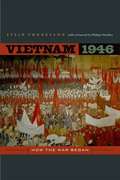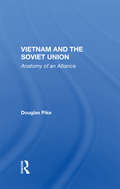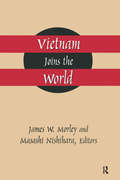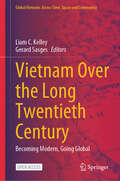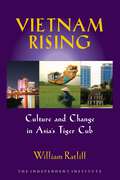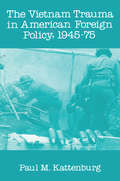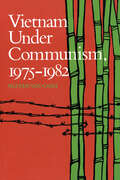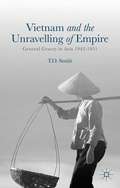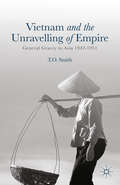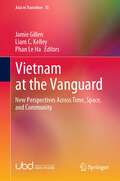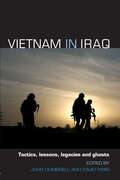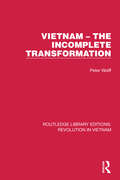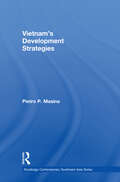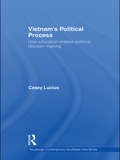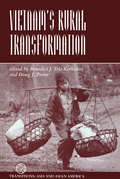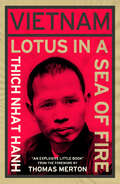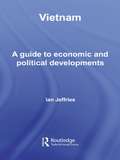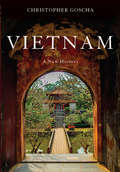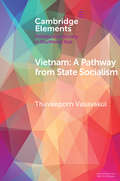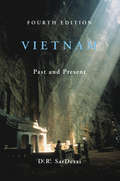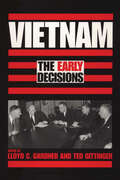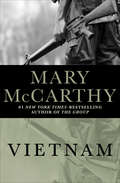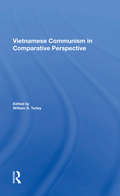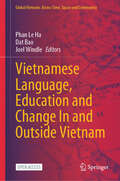- Table View
- List View
Vietnam
by Bill HaytonThe eyes of the West have recently been trained on China and India, but Vietnam is rising fast among its Asian peers. A breathtaking period of social change has seen foreign investment bringing capitalism flooding into its nominally communist society, booming cities swallowing up smaller villages, and the lure of modern living tugging at the traditional networks of family and community. Yet beneath these sweeping developments lurks an authoritarian political system that complicates the nation's apparent renaissance. In this engaging work, experienced journalist Bill Hayton looks at the costs of change in Vietnam and questions whether this rising Asian power is really heading toward capitalism and democracy. Based on vivid eyewitness accounts and pertinent case studies, Hayton's book addresses a broad variety of issues in today's Vietnam, including important shifts in international relations, the growth of civil society, economic developments and challenges, and the nation's nascent democracy movement as well as its notorious internal security. His analysis of Vietnam's "police state," and its systematic mechanisms of social control, coercion, and surveillance, is fresh and particularly imperative when viewed alongside his portraits of urban and street life, cultural legacies, religion, the media, and the arts. With a firm sense of historical and cultural context, Hayton examines how these issues have emerged and where they will lead Vietnam in the next stage of its development.
Vietnam 1946: How the War Began
by Stein TonnessonBased on multiarchival research conducted over almost three decades, this landmark account tells how a few men set off a war that would lead to tragedy for millions. Stein was one of the first historians to delve into scores of secret French, British, and American political, military, and intelligence documents.
Vietnam And The Soviet Union: Anatomy Of An Alliance
by Douglas PikeExamining the long and turbulent relationship between Vietnam and the Soviet Union, Douglas Pike traces its political, economic, and diplomatic history from the Bolshevik Revolution to today's deep and intricate alliance. He not only explores this extraordinary relationship but also outlines its great geopolitical significance for the entire region
Vietnam Joins the World: American and Japanese Perspectives
by James Morley Masashi NishiharaTen American and Japanese specialists offer a comprehensive analysis of one of the most dramatic developments in Asia today: the re-emergence of Vietnam - not as the belligerent champion of a militant ideology and socialist cause, but as an open, friendly country seeking a respected place in the world community. Basing their observations on five years of study, visits to Vietnam, and numerous interviews with knowledgeable officials, scholars and businessmen there and in the United States and Japan, the authors evaluate the political, ecnomic, social and foreign policy changes that have been taking place in Vietnam over the past decade, trace the responses of the United States and Japan and offer a policy prescription for responding to the challenges of the future.
Vietnam Over the Long Twentieth Century: Becoming Modern, Going Global (Global Vietnam: Across Time, Space and Community)
by Liam C. Kelley Gerard SasgesThis open access book provides fascinating insights into the incredible changes that Vietnam underwent in the long twentieth century as it transformed from an early modern kingdom to a European colony, to a divided land with opposing ideologies, and to a unified country in a globalized world. At each stage in this long century of changes, there were Vietnamese who sought to mold their society into some vision of “modernity.” The book looks at multiple, rather than one form of modernity, and links those forms with the different political moments that Vietnam experienced, in tandem with the outside interlocutors that were maintained during those periods. As such, this book provides a holistic view of the many forms of modernity and their global links that can be found in Vietnam over the course of the long twentieth century. These multiple modernities are documented in this book, and the authors do so by bringing together the strengths of “traditional” language-based area studies scholarship with the insights that an awareness of trans-national and global perspectives provides. Relevant to historians and researchers in the broader arena of Southeast Asian studies with a particular interest in Vietnam—its journey from past to present—this book is a must-read engagement with a country that has undergone and continues to experience, rapid transformation.
Vietnam Rising: Culture and Change in Asia's Tiger Cub
by William RatliffFrom Vietnam&’s acceptance into the World Trade Organization to its post-Vietnam War reform and socialist ideals, this overview concisely examines the cultural, political, and economic changes currently at work in Vietnam within a historical context and then discusses the effects such changes have had on businessmen and entrepreneurs.Vietnam is credited with having one of the &“most successful antipoverty campaigns ever undertaken anywhere, raising up about two-thirds of those who lived in poverty two decades ago, by combating both the anti-productive aspects of tradition and the needless poverty still imposed to some degree by the dead economic hand of Ho Chi Minh and his followers.&” A country that experienced chronic, centrally imposed food shortages for decades has radically changed course, greatly reduced the percentage of the population living in poverty, from over 70 percent in the mid-1980s to 14.7 percent in 2007. Except for China, Vietnam has had the fastest growing economy in all of Southeast Asia. In Vietnam Rising, William Ratliff, one of the leading experts on the economics of Southeast Asian countries, examines the remarkable, pro-market, pro-entrepreneurial changes underway in Vietnam. Ratliff then reviews the cultural and historical experiences that provide the foundation for current pro-enterprise reforms, discusses the changes that followed &“reunification&” at the end of the Vietnam War, and the reforms that began twenty years ago. In the process, Vietnam Rising illuminates the hows and whys of entrepreneurial opportunities and the changes necessary to address the remaining traditional and institutional challenges for creating a truly open, market-based, entrepreneurial climate
Vietnam Trauma in American Foreign Policy: 1945-75
by Alan R. BealsThis study of ten fateful decisions made on Indochina between 1961-75 highlights the ascent of the civilian militarists and of strategy over diplomacy in United States policymaking and reveals the inexorably interlinked and escalating character of the decisions and the central purpose of American presidents: not to have to face the expected domestic political consequences of defeat in Indochina. As a result, we were led into a prolonged stalemate in which "acting" and the management of programs became a more important preoccupation than thinking about our purposes and values, in which analysis become wholly subjective and therefore defective, and in which decision-making occurred in a closed system which did not allow for divergent inputs.
Vietnam Under Communism, 1975–1982
by Nguyen Van CanhBased on his own experiences, extensive use of primary and secondary sources, and interviews with Vietnamese refugees who lived under the new order, Nguyen Van Canh analyzes the contemporary political and administrative structure of Vietnam and its leaders, culture, education, economy, and foreign policy.
Vietnam and the Unravelling of Empire: General Gracey in Asia 1942-1951
by T. O. SmithThe Vietnam War and Indian independence devastated British policy towards Asia. The Labour Government failed to understand its commitments. Yet some senior British officers were prepared to work alongside Asian nationalism in order to secure British interests. This created a radical local fusion of imperial, diplomatic and humanitarian policies.
Vietnam and the Unravelling of Empire: General Gracey in Asia 1942-1951
by T. SmithThe Vietnam War and Indian independence devastated British policy towards Asia. The Labour Government failed to understand its commitments. Yet some senior British officers were prepared to work alongside Asian nationalism in order to secure British interests. This created a radical local fusion of imperial, diplomatic and humanitarian policies.
Vietnam at the Vanguard: New Perspectives Across Time, Space, and Community (Asia in Transition #15)
by Le Ha Phan Jamie Gillen Liam C. KelleyThis transdisciplinary edited book explores new developments and perspectives on global Vietnam, touching on aspects of history, identity, transnational mobilities, heritage, belonging, civil society, linguistics, education, ethnicity, and worship practices. Derived from the Engaging With Vietnam: An Interdisciplinary Dialogue conference series, this cutting-edge collection presents new scholarship and also represents new ways of knowing global Vietnam. Over the past 10 years, knowledge production about Vietnam has diversified in various ways as globalization, the internationalization of higher education, and the digital revolution have transformed the world, as well as Vietnam. Whereas as late as a decade ago, knowledge about Vietnam was still largely the preserve of scholars in Vietnam and a coterie of related experts outside of the country at a select few universities, today we find scholars working on Vietnam in myriad contexts. This transformation has introduced new voices and new perspectives, which this book champions. A critical text engaging a range of historical and contemporary debates about Vietnam, this book is an indispensable volume for the Southeast Asian Studies student and scholar in the humanities and social sciences.
Vietnam in Iraq: Tactics, Lessons, Legacies and Ghosts (Contemporary Security Studies)
by David Ryan John DumbrellMore than most post-1970 conflicts involving US forces, the conflict in Iraq has been fought out against a background of frequently invoked memories from the era of the Vietnam War. The essays in this book offer a series of perspectives on connections and parallels between the Vietnam War and the 2003 invasion of, and conflict in, Iraq. The contributors particularly examine the impact of the Vietnam analogy on the War in Iraq, assessing the military tactical lessons learned from the Vietnam War and exploring the influence and persistence of its legacy in US politics, culture and diplomacy. The volume holds up to original interrogation some commonly held assumptions about historical analogy, and several distinguished authorities on the Vietnam War era, in particular, offer their thoughts on the value and applicability of Vietnam-Iraq parallels. If most contributions point out some obvious dissimilarities between the two eras, notably the transformed post-Cold War international environment, the similarities, particularly those relating to the problems of cultural misunderstanding, are also apparent. Vietnam in Iraq will be of great interest for all students and researchers of the Iraq War, strategic studies, international relations and American politics.
Vietnam – The Incomplete Transformation (Routledge Library Editions: Revolution in Vietnam #5)
by Peter WolffThis book, first published in 1999, analyses the history and major economic features of the Vietnamese reform process. The attempt to establish a post-reunification centrally planned economic system, a collectivised agriculture and a capital-intensive and inward-oriented industrial sector had largely failed, provoking the development of a parallel economy which turned out to be the nucleus of an emerging private sector. The book focuses on the reform of enterprises and the financial sector and gives an overall picture of the reform efforts in the areas of rural development, the social sectors and environmental policy, and assesses the further changes and reforms needed in the country.
Vietnam's Development Strategies (Routledge Contemporary Southeast Asia Series)
by Pietro MasinaTaking a developmental approach, this book critically reviews Vietnam's reform process and shows how the country’s reform agenda is still dominated by a ‘developmental orthodoxy’ inspired by a post-Washington consensus. The author argues that a wider debate is needed in order to give national policy makers the full spectrum of alternatives to support well-informed policy decisions. In particular, the book indicates that two issues central for any analysis of the Vietnamese development reform process are substantially underdeveloped in the current scientific debate: the experience of the East Asian developmental state and the question of socialism. Presenting a way of thinking about Vietnam that goes beyond the orthodox, the book sets out the various paradigms through which the Vietnamese economy can be analyzed. This is a welcome addition to the literature and will appeal to both practitioners working in the field and the academic community in Southeast Asian studies, economics and development.
Vietnam's Political Process: How education shapes political decision making (Routledge Contemporary Southeast Asia Series)
by Casey LuciusIn a system that is known for its covert political style, Vietnam’s decision making process is often described as either consensus-based or simply confusing and inexplicable. This book provides an approach to understanding political decision making in Vietnam by recognizing enduring values that are derived from State-controlled education and official historical narratives. The nation’s official historical narrative has led to the development of protected values that are called upon during political decision making. In order to secure these values, such as regime stability, national independence, and social order, officials must act within accepted rules of appropriate political behavior. The book shows that through State-run education, mandatory defense training, and membership in mass organizations, Vietnamese citizens are taught social and political ethics, and their identity is moulded in concert with this process. Using textbooks and education to understand the underlying values within Vietnam’s society is used as the contextual framework for two case studies - the problem of landmines and the on-going threat of avian influenza - which examine how authorities frame problems, negotiate, and deal with potential crises. This book will be of great interest of academics and students within Asian studies, but also for policy makers involved with the country and those doing business in Vietnam, including non-governmental organizations, private businesses and charitable groups.
Vietnam's Rural Transformation (Transitions: Asia And Asian America Ser.)
by Benedict J KerkvlietSince the mid-1980s, Vietnam has experienced remarkable economic, political, and social change. This is the first study in English to focus on rural Vietnam?where nearly 80 percent of Vietnam's people live, much of its economic production occurs, and political upheavals earlier this century changed the course of history.Analyzing the impact of economic liberalization on the countryside, the contributors note that despite significant improvements in real income for most rural Vietnamese, poverty is still pronounced and socioeconomic inequality appears to be growing. The poorest now appear to have less access to educational and health services. Environmental conditions also pose significant problems. Highlighting the dynamic political scene in Vietnam, the contributors also consider the interplay between national policymaking and local pressures and activity.
Vietnam: A Buddhist Proposal for Peace
by Thich Nhat HanhThis stunning commentary on the cultural and political background to the war in Vietnam resonates deeply as the first work of Vietnamese writer, peace activist, and Buddhist monk Thich Nhat HanhThis rare book from 1967 is one of the very few written in English giving a Vietnamese perspective on the Indochina Wars. Many years ahead of its time, Vietnam: Lotus in a Sea of Fire will be welcomed by historians and readers of contemporary Vietnamese narratives. As war raged in Vietnam, the Zen monk Thich Nhat Hanh became a leading figure in the Buddhist peace movement. With the help of friends like Catholic monk Thomas Merton, he published Vietnam: Lotus in a Sea of Fire in 1967 in the US (and underground in Vietnam as Hoa Sen Trong Biển Lửa), his uncompromising and radical call for peace. It gave voice to the majority of Vietnamese people who did not take sides and who wanted the bombing to stop. Thomas Merton wrote the foreword, believing it had the power to show Americans that the more America continued to bomb Vietnam, the more communists it would create. This was Thich Nhat Hanh's first book in English and made waves in the growing anti-war movement in the United States at the time. Thich Nhat Hanh's portrayal of the plight of the Vietnamese people during the Indochina Wars is required reading now as the United States and Europe continue to grapple with their roles as global powers—and the human effects of their military policies. Vietnam: Lotus in a Sea of Fire is of special interest for students of peace and conflict studies and Southeast Asian history. It also gives the reader insights into the thought of the young Thich Nhat Hanh, who would later go on to found--in exile--Plum Village in France, the largest Buddhist monastery outside Asia, and influence millions with his teachings on the path of peace and mindfulness.
Vietnam: A Guide to Economic and Political Developments (Guides to Economic and Political Developments in Asia)
by Ian JeffriesWinning the Vietnam War proved easier than winning the peace. Since 1975, the reunited country has faced the problem of how a poorer, planned economy in which state ownership and control could successfully absorb a more advanced, capitalist economy. In addition, the collapse of communism and the end of the Cold War heralded a new age in Vietnam’s internal and external relations. Vietnam traces developments since the end of the Vietnam War, including recent economic reforms, the politics of the Communist Party, and the re-establishment of relations with the United States. It gives a comprehensive and informative overview of the current political and economic situation in Vietnam today.
Vietnam: A New History (From Indochina To Vietnam #Vol. 2)
by Christopher GoschaThe definitive history of modern Vietnam, lauded as "groundbreaking" (Guardian) and "the best one-volume history of modern Vietnam in English" (Wall Street Journal) and a finalist for the Cundill History Prize In Vietnam, Christopher Goscha tells the full history of Vietnam, from antiquity to the present day. Generations of emperors, rebels, priests, and colonizers left complicated legacies in this remarkable country. Periods of Chinese, French, and Japanese rule reshaped and modernized Vietnam, but so too did the colonial enterprises of the Vietnamese themselves as they extended their influence southward from the Red River Delta. Over the centuries, numerous kingdoms, dynasties, and states have ruled over -- and fought for -- what is now Vietnam. The bloody Cold War-era conflict between Ho Chi Minh's communist-backed Democratic Republic of Vietnam and the American-backed Republic of Vietnam was only the most recent instance when war divided and transformed Vietnam. A major achievement, Vietnam offers the grand narrative of the country's complex past and the creation of the modern state of Vietnam. It is the definitive single-volume history for anyone seeking to understand Vietnam today.
Vietnam: A Pathway from State Socialism (Elements in Politics and Society in Southeast Asia)
by Thaveeporn VasavakulThis is a study of Vietnam's socialist transition and state transformation, generally known as đổi mới. It examines the drivers of socialist-regime change, the nature of the đổi mới state, and the basis of regime legitimacy in Vietnam. The Element argues that despite its 'one-party rule' label, the party-state apparatus that channels said rule has become fragmented. State-building during the đổi mới period involved negotiations and bargaining that redefine authority and power relations within the state apparatus. The party-state's accountability projects are designed to target the specific self-aggrandizing tendencies of the state apparatus, its policies, and abuse of state power. At the leadership level, patterns of resource allocation underlying the đổi mới growth model as well as the VCP's cadre rotation approach have accommodated central and sub-national state elites across sectors and levels, helping shore up the legitimacy of the đổi mới state in the eyes of the state elite. The combination of sustained economic growth, expansion of political space, accountability, and tolerance of small-scale public protests have been factors in strengthening regime-society legitimization.
Vietnam: Past and Present
by D. R. SarDesaiRecent U.S. military interventions in Kosovo and Iraq have stirred public memories of the long and costly Vietnam conflict. Scholars and strategists, military leaders and media continue to raise questions such as what motivated the Vietnamese to wage a protracted conflict first against the French and later against the Americans at such great economic and emotional cost. In this fourth edition, SarDesai provides new insights on the decision-making process in Hanoi and Washington D.C. during the Vietnam conflict. He analyzes the extensive historiographical dialog in the 1990's involving scholars, strategists and policy-makers of the two countries. He addresses the postwar era of Vietnam's reconstruction, administrative reorganization, the U.N. sponsored Cambodian settlement, as well as Vietnam's membership and growing role in the ASEAN. SarDesai also looks at the new economic and strategic relationship between Vietnam and its former foe marked by President Clinton's visit to Hanoi and the increasing U.S. investment and trade in Vietnam in the aftermath of the Bilateral Trade Treaty (BTA) of July 2000. Concise, clear, and manageable coverage of Vietnamese history for one semester courses. Updated and expanded in the 4th edition to cover the most recent events and issues facing Vietnam, as well as providing greater depth of coverage to primary historical material.
Vietnam: The Early Decisions
by Lloyd C. Gardner and Ted GittingerThis anthology examines the turmoil and conflicting advice that led the US into Vietnam and the roles played by Presidents Kennedy and Johnson. For many Americans, Oliver Stone&’s film JFK left no doubt that before his assassination Kennedy had determined to quit Vietnam. Yet the historical record offers a more complex view. In this fresh look at the archival evidence, noted scholars take up the challenge to provide us with their conclusions about the early decisions that put the United States on the path to the greatest American tragedy since the Civil War. The book is divided into four sections. Parts one and two delve into the political and military contexts of the early decisions. Part three raises the intriguing questions of Kennedy&’s and Johnson's roles in the conflict, particularly the thorny issue of whether Kennedy did, in fact, intend to withdraw from Vietnam and whether Johnson reversed that policy. Part four reveals an uncanny parallel between early Soviet policy toward Hanoi and US policy toward Saigon.
Vietnam: Writings By Activists
by Mary McCarthyHailed as &“the most provocative and disturbing analytical indictment . . . of America&’s role in Vietnam&” by the New York Times, this is Mary McCarthy&’s riveting account of her journeys to Saigon and Hanoi In 1967, the editor of the New York Review of Books sent Mary McCarthy to Vietnam. In this daring and incisive account, McCarthy brings her critical thinking and novelist&’s eye to one of the most unpopular wars in our nation&’s history.Outraged over America&’s role in the Vietnam War, McCarthy arrived in Saigon with her own preconceived notions. Her time there did little to alter those beliefs. Focusing on the moral consequences—&“the worst thing that could happen to our country would be to win this war&”—McCarthy provides firsthand reports from the front line. She describes visits to villages built for Vietnamese refugees torn between the terror that Americans would stay and the fear that they would go.From its coverage of the daily horrors of war to notes on the logistical challenge of bringing 494,000 soldiers home, this is a timely and timeless work from one of America&’s most outspoken and respected critics.This ebook features an illustrated biography of Mary McCarthy including rare images from the author&’s estate.
Vietnamese Communism In Comparative Perspective
by William S TurleyThis book focuses on how the Vietnam Communist party adapted to its environment in order to achieve and exercise power and to what degree these adaptations made the Vietnamese revolution distinctive.
Vietnamese Language, Education and Change In and Outside Vietnam (Global Vietnam: Across Time, Space and Community)
by Dat Bao Phan Le Ha Joel WindleThis open access edited book attempts to break new ground in investigating multiple facets of Vietnamese language, education and change in global contexts, engaging with global Vietnam through complex lenses of language and education. Issues of language, globalization, and global identities have often been framed through the lens of hierarchical/binary power relations, and/or through a dichotomy between hyper-central languages, such as English, and revisualized or marginalized local language and cultures. In this book, this dichotomy is turned on its head by considering how Vietnam and Vietnamese are constructed in and outside Vietnam and enacted in global spaces of classrooms, textbooks, student mobility, community engagement, curriculum, and intercultural contacts. Vietnamese is among the world’s most spoken languages and is ranked in the top 20th in terms the number of speakers. Yet, at the same time, as a ‘peripheral’ or ‘southern’ global language as often seen in the Global North-Global South spectrum, the dynamics of multilingual and multicultural encounters involving Vietnamese generate distinctive dilemmas and tensions, as well as pointing to alternative ways of thinking about global phenomena from a fresh angle. Rather than being outside of the global, Vietnamese - like many other ‘non-central’ global languages - is present in diasporas, commercial, and transnational structures of higher education, schooling, and in the more conventional settings of primary and secondary school, in which visions of culture and language also evoke notions of heritage and tradition as well as bring to the fore deep seated ideological conflicts across time, space, communities, and generations. Relevant to students and scholars researching language, education, identity, multiculturalism, and their intersections, particularly related to Vietnam, but also in Southeast Asia and beyond, this volume is a pioneering investigation into overlooked contexts and languages from a global, southern-oriented perspective."This book presents an eclectic collection of 15 chapters unified by an interest in developing and teaching the Vietnamese language. To my knowledge, there has been no previous attempt to make the national language of Vietnam a focus for as many perspectives as are documented in the book. In this regard, the book makes an original and intriguing contribution to the literature on Vietnamese culture, including the culture of Vietnam’s expanding diaspora. The book is pioneering in the extent to which it draws attention to the many roles played by a national language in a nation’s political, social and cultural development. It also documents the challenges of preserving a national language in settings where it is at risk of being marginalized. It is pleasing that so many of the contributing authors are young Vietnamese scholars who can provide a distinctly Vietnamese perspective on concepts and practices of global significance."- Dr. MartinHayden, Emeritus Professor of Higher Education, Southern Cross University, Australia "Vietnamese Language, Education and Change In and Outside Vietnam brings together an excellent collection of chapters that highlight the diverse and important but under-explored roles Vietnamese language plays in different settings within and outside Vietnam. The fifteen chapters of this much needed book provide unique insights into various aspects and meanings of Vietnamese language. Collectively, the volume contributes to broadening our view about the evolution and transformation of Vietnamese language under the impacts of local, national, regional and global forces. The book invites readers to engage in a reflective and intersectional approach to rethinking and re-examining our understandings of the changes and developments of Vietnamese language over the history of the country."- Dr Ly Tran, Professor, Centre for Research for Educational Impact (REDI), Deakin University, Australia, and Founder: Australia-Vietnam
